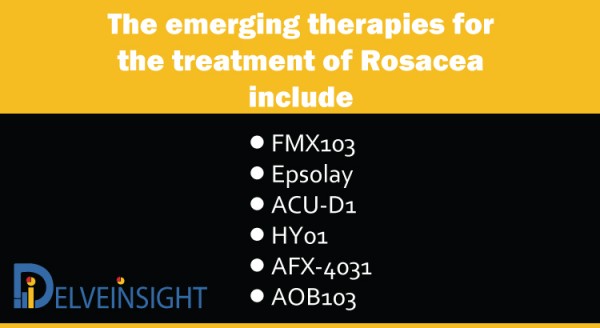Rosacea is a rash involving the central face that most often starts between the age of 30 and 60 years. It is common in those with fair skin, blue eyes and Celtic origins. It may be transient, recurrent or persistent and is characterized by its color, red. The disorder is more frequently diagnosed in women, but tends to be more severe in men. There is also evidence that rosacea may tend to run in families, and may be especially prevalent in people of northern or eastern European descent.
Some of the key facts of Rosacea market report
1. The total prevalent population of Rosacea in the 7MM was 47,634,256 in 2017.2. The prevalence of Rosacea was found in the United States with 16,652,170 cases in 2017.3. Germany had a prevalent population of Rosacea with 8,383,943 cases in 2017.4. France had Rosacea prevalent population of 6,082,002 cases in 2017.5. Italy had a prevalent population of Rosacea with 3,217,083 cases in 2017.

Request for sample pages @ Rosacea market
Key benefits of the report
1. Rosacea market report covers a descriptive overview and comprehensive insight of the Rosacea epidemiology and Rosacea market in the 7 MM (the United States, EU5 (Germany, Spain, France, Italy, UK) & Japan.)2. Rosacea market report provides insights into the current and emerging therapies.3. Rosacea market report provides a global historical and forecasted market covering drug outreach in 7 MM.4. Rosacea market report offers an edge that will help in developing business strategies by understanding trends shaping and driving the Rosacea market.
The current Rosacea therapeutic landscape can be divided into four major categories based on the route of administration and the approved usage for the condition. These are topical retinoids, topical antibiotics, oral tetracycline-class antibiotics (TCAs), and oral retinoids.
Among Topical therapies, topical retinoids mainly include Tretinoin, Tazarotene, Adapalene, and Clindamycin/tretinoin, and several others are used to reduce erythema, papules and pustules, and telangiectasias. Among these, Tretinoin has the lowest cost and most commonly prescribed topical retinoid, accounting for the majority of the population.
Topical antibiotics, such as metronidazole (e.g. Metrolotion), clindamycin, erythromycin, azelaic acid (e.g. Fincea), benzoyl peroxide, benzoyl peroxide/clindamycin, benzoyl peroxide/erythromycin, sulfacetamide, and sulfacetamide/sulfur, are applied directly to the skin to kill bacteria on the surface of the skin.
Topical antibiotics are the most commonly prescribed class of drug for all sexes and age groups. The most common topical antibiotics prescribed are metronidazole (for an estimated half of the population of topical antibiotics) followed by clindamycin, erythromycin, and azelaic acid.
Table of contents
1. Key Insights
2. Executive Summary of Rosacea
3. Competitive Intelligence Analysis for Rosacea
4. Rosacea: Market Overview at a Glance
4.1. Rosacea Total Market Share (%) Distribution in 2017
4.2. Rosacea Total Market Share (%) Distribution in 2030
5. Rosacea: Disease Background and Overview
5.1. Introduction
5.2. Sign and Symptoms
5.3. Pathophysiology
5.4. Risk Factors
5.5. Diagnosis
6. Patient Journey
7. Rosacea Epidemiology and Patient Population
7.1. Epidemiology Key Findings
7.2. Assumptions and Rationale: 7MM
7.3. Epidemiology Scenario: 7MM
7.3.1. Rosacea Epidemiology Scenario in the 7MM (2017-2030)
7.4. United States Epidemiology
7.4.1. Rosacea Epidemiology Scenario in the United States (2017-2030)
7.5. EU-5 Country-wise Epidemiology
7.5.1. Germany Epidemiology
7.5.1.1. Rosacea Epidemiology Scenario in Germany (2017-2030)
7.5.2. France Epidemiology
7.5.2.1. Rosacea Epidemiology Scenario in France (2017-2030)
7.5.3. Italy Epidemiology
7.5.3.1. Rosacea Epidemiology Scenario in Italy (2017-2030)
7.5.4. Spain Epidemiology
7.5.4.1. Rosacea Epidemiology Scenario in Spain (2017-2030)
7.5.5. United Kingdom Epidemiology
7.5.5.1. Rosacea Epidemiology Scenario in the United Kingdom (2017-2030)
7.5.6. Japan Epidemiology
7.5.6.1. Rosacea Epidemiology Scenario in Japan (2017-2030)
8. Treatment Algorithm, Current Treatment, and Medical Practices
8.1. Rosacea Treatment and Management
8.2. Rosacea Treatment Algorithm
9. Unmet Needs
10. Key Endpoints of Rosacea Treatment
11. Marketed Products
11.1. List of Marketed Products in the 7MM
11.2. Drug Name: Company Name
11.2.1. Product Description
11.2.2. Regulatory Milestones
11.2.3. Other Developmental Activities
11.2.4. Pivotal Clinical Trials
11.2.5. Summary of Pivotal Clinical Trial
List to be continued in report
12. Emerging Therapies
12.1. Key Cross
12.2. Drug Name: Company Name
12.2.1. Product Description
12.2.2. Other Developmental Activities
12.2.3. Clinical Development
12.2.4. Safety and Efficacy
12.2.5. Product Profile
List to be continued in report
13. Rosacea: Seven Major Market Analysis
13.1. Key Findings
13.2. Rosacea Market Size in 7MM
13.3. Rosacea Market Size by Therapies in the 7MM
14. Attribute analysis
15. 7MM: Market Outlook
15.1. United States: Market Size
15.1.1. Rosacea Total Market Size in the United States
15.1.2. Rosacea Market Size by Therapies in the United States
15.2. EU-5 countries: Market Size and Outlook
15.3. Germany Market Size
15.3.1. Rosacea Total Market Size in Germany
15.3.2. Rosacea Market Size by Therapies in Germany
15.4. France Market Size
15.4.1. Rosacea Total Market Size in France
15.4.2. Rosacea Market Size by Therapies in France
15.5. Italy Market Size
15.5.1. Rosacea Total Market Size in Italy
15.5.2. Rosacea Market Size by Therapies in Italy
15.6. Spain Market Size
15.6.1. Rosacea Total Market Size in Spain
15.6.2. Rosacea Market Size by Therapies in Spain
15.7. United Kingdom Market Size
15.7.1. Rosacea Total Market Size in the United Kingdom
15.7.2. Rosacea Market Size by Therapies in the United Kingdom
15.8. Japan Market Outlook
15.8.1. Japan Market Size
15.8.2. Rosacea Total Market Size in Japan
15.8.3. Rosacea Market Size by Therapies in Japan
16. Access and Reimbursement Overview of Rosacea
17. KOL Views
18. Market Drivers
19. Market Barriers
20. Appendix
20.1. Bibliography
20.2. Report Methodology
21. DelveInsight Capabilities
22. Disclaimer
23. About DelveInsight
*The table of contents is not exhaustive; the final content may vary.
Media Contact
Company Name: DelveInsight
Contact Person: Priya Maurya
Email:Send Email
Phone: +919650213330
Address:304 S. Jones Blvd #2432
City: Albany
State: New York
Country: United States
Website: https://www.delveinsight.com/

